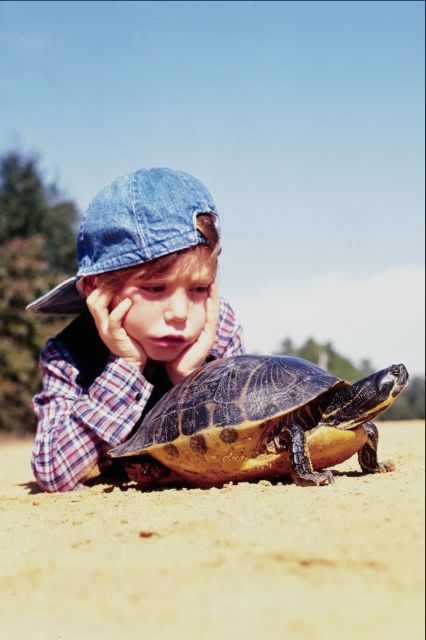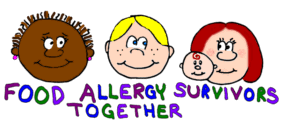|
|
Communication with Children who have Food Allergies

One of the issues heavy on my heart in speaking about children with food allergies is communication. The reason I care so much about this topic is because I was not diagnosed with food allergies until age 16, mostly due to my inability to communicate effectively with doctors, my parents, and other adults. This would come as a shock to most, considering that I am a writer and one of my few skills is communication!
Many parents have mentioned that their children are still on their allergens (or have been reintroduced to them) and are not saying they feel sick; therefore, they have outgrown their allergies.
Such may not be the case. The truth is that children--even the most intelligent--are poor communicators, at least when compared to the abilities they will have once they reach adulthood.
A few factors may contribute to children hiding reactions and/or not being able to adequately explain them.
Personality
The personality of a child can greatly effect communication, on both ends of the spectrum.
A shy child may not communicate with adults--such as caregivers and teachers--about pain. As a child I generally hid my reactions from most adults because I didn't like the extent of the attention I received when people found out, or the attention I drew to myself in a school-type situation.
An outgoing child may "act out" from a reaction. When at home I was outgoing and could get very ornery (crying, yelling, etc.) when sick. The child may express his/her reaction through acting out. The problem is that the family may consider this child a "high strung" child and not recognize that these outbursts might be because the child is feeling ill. My parents felt I was attempting to gain attention, not that I was sick.
Inability to communicate pain effectively.
When I was about five years old my mom was in the hospital undergoing cancer treatments as my father struggled to care for the family. One morning I sat on the toilet experiencing a reaction. My dad kept asking "What's wrong?" All I could answer was, "I'm sick!" He could not get anything else out of me. This was the only way I knew to communicate my pain.
Many times when asked about my pain I would reply to doctors that my "stomach hurt." Only years later did I learn that my stomach was higher up and my abdomen was actually what hurt so badly. Children, simply put, cannot effectively explain where pain occurs or exactly what is going on.
Developmental inability
Children do not even have the ability of abstract thinking until twelve or older. This is advanced, logical reasoning. An example would be a child thinking or saying, "If I drink milk, milk will make me sick. I do not want to be sick. Therefore, I cannot drink milk" and truly understanding this comment, not just parroting it. They may not understand, for example, that if they eat a yummy candy bar that the pain that follows is directly caused by the candy bar, even if Mom and Dad say so.
Here are a couple more scenarios that might help with understanding the communication gap between adults and children.
When I was growing up, my grandmother went by "Nonnie" (because she didn't like grandmotherly terms) and my aunt went by "Lala," because she didn't think I'd be able to pronounce her name. I didn't understand until years later that these were nicknames, or even understand the concept of nicknames or why people would use them. I thought they were their real names. As a new speaker I gave a nickname to someone (my brother) and used the term "Boy." It was descriptive of who and what he was, and I knew it was a nickname because I knew no one would be named Boy. I had no ability, however, to understand the adult concept of nicknames.
As another example, my parents decided that my brother and I should call their two close friends by the terms "Aunt ____" and "Uncle ____." I became flabbergasted years later when I finally realized that they weren't related to me in any way. "I was sure you knew!" my mom replied, equally flabbergasted. She was certain she had explained it to me. But by using the terms "aunt" and "uncle" she had made it impossible for me to differentiate between them and my other relatives.
These communication gaps don't exist because either person is dim-witted or not paying attention, they exist because children can't understand everything that adults want them to or think they can.
It is not your child's fault if s/he cannot adequately talk about food allergies with you. S/he is possibly not wired for this type of conversation yet.
Parental disbelief
Parents want the best for their kids. Many parents believe that their children will outgrow their food allergies and look forward to this happening. In running FAST, however, I have yet to be informed by anyone that their children's legitimately diagnosed allergies all vanished and they are 100% cured.
Many parents want to think that their children will outgrow their allergies. And this is possible. However, this belief can be dangerous. My mom was one of the parents who wanted to think her daughter would "grow out" of food allergies or otherwise be cured. She had me test/challenge my allergens often. My health grew worse and worse until I was bedridden.
It is very important for parents to accept a diagnosis of food allergies as well as the possibility of them being lifelong. This does not mean that they will be. However, not believing this could be very detrimental to children's health and wellbeing.
Rewards
One of the most difficult reasons children may be bad communicators is because they feel that the treat is a reward in itself.
In other words, children may pretend not to experience a reaction because they really enjoyed a special new treat they were given and do not want to have to give it up.
Although I was a teenager by the time I was diagnosed, I exprerienced this very same thing. I truly loved a special food and for a long time did not "admit" that it made me sick. The reward was too great.
Some Examples
One of the best ways to illustrate communication gaps is by taking a look at some sweet yet humorous statements from children that have been shared with FAST over the years.
On curing food allergies: "Maybe you need to brush the teeth in your stomach" (J., 5 years old).
After being told that Mommy can't eat sesame seeds: "You're not 'lergic to Elmo are you?" (the bear, 5 years old, confusing sesame seeds and Sesame Street).
After being told that allergic does not mean doesn't like, and being told about his allergy to bug bites/stings: "I told her 'lergic means ya don't like it" (the bear, 5 years old, thinking about the word "bugs").
After Mom tried to hand him a new safe food in the supermarket: "Mommy, first read it and make sure it's not allergic to me!" (A.J., 4 years old).
After being told by Mom that he couldn't eat pizza: "Mommy, I know, I know, I 'lergic to pizza, it gots milk and cheese and peanuts in it...I already knowed this before" (Joshua, 2 years old).
"Is there anything good about allergicisity?" "The Bear" asked his mother. Before she could answer, he said he thought there were some good things. For example, if a bad person has an allergy to bees and the police can't run as fast, maybe the bad person would get stung by a bee and then the police could catch him (the bear, 7).
In response to her aunt asking her what she's allergic to: "Half of everything!" (Kaycee, 5 years old (and allergic to 13 foods)).
"The bear" was caring for a paper doll character as a school project. It was raining outside, so he placed it in a plastic bag. When the librarian inquired why, "the bear" replied, "Because he's SEVERELY ALLERGIC to water." He then made an epinephrine belt for it.
In Conclusion
In conclusion, please be careful when communicating with your child, and understand that they do not communicate on the same level as adults. This can cause problems in dealing with food allergies as you may feel you need to rely on your child to let you know when s/he is sick. Speak to your allergist if you have questions on how to discuss communication issues with your child and especially if you are about to (or desire to) reintroduce foods.
In the very least, be aware that communication gaps can and do exist among parents and even the smartest of children.
|

